A Man Called Scar Read online
Warning: The unauthorized reproduction or distribution of this copyrighted work is illegal. No part of this book may be scanned, uploaded or distributed via the Internet or any other means, electronic or print, without the publisher’s permission. Criminal copyright infringement, including infringement without monetary gain, is investigated by the FBI and is punishable by up to 5 years in federal prison and a fine of $250,000 (http://www.fbi.gov/ipr/).
Published by The Hartwood Publishing Group, LLC,
Hartwood Publishing, Phoenix, Arizona
www.hartwoodpublishing.com
A Man Called Scar
Copyright © 2013 by Jim Cox
Hartwood Digital Release: December 2017
All Rights Reserved. No part of this book may be used or reproduced in any manner whatsoever without written permission, except in the case of brief quotations embodied in critical articles and reviews.
This book is a work of fiction. The names, characters, places, and incidents are products of the writer’s imagination, or have been used fictitiously and are not to be construed as real. Any resemblance to persons, living or dead, actual events, locales, or organizations is entirely coincidental.
A Man Called Scar by Jim Cox
After losing his mother and father at the age of thirteen, the young Bart Carter finds himself alone in strange country on his way to Colorado. Not long into his trek, he comes across a drunk who uses a long leather whip on him. One lash cuts a gash from the boy’s ear to his chin, marking him for life with a grotesque scar. Bart is dying of infection in his injuries when Liz Douglas, a girl his own age who was traveling in a wagon train with her parents, finds him lying unconscious in a field. Bart becomes a member of the Douglas family and as time passes, Bart’s and Liz’s relationship blossoms, even though they aren’t aware of it.
It takes months, but Bart finally accepts his appearance and earns his way into society’s mainstream in the little Colorado town of Flat Peaks. During his trek on the wagon train, Bart generates a friendship with the Navajo and Ute Indians, especially with an old chief of great importance which becomes vital as the family ventures into ranching.
As Bart matures, he learns to drive and service cattle. He learns to hunt wild animals and the skill of fighting from Mr. Douglas. As time passes, Bart and Liz leave the ranch and go their own way. Bart to Chicago, where he works in a cattle slaughter plant, and Liz to Philadelphia to finishing school to become a school teacher.
Returning to Flat Peaks a few years later, Liz has matured into a beautiful woman, and Bart, or Scar as he is now known, has grown into a tall, muscular man. It takes a near death experience of Scar getting shot by hoodlums for Liz and Bart to face the reality of their love for each other. Scar thinks Liz is more deserving of someone who can shower her with life’s luxuries, but Liz has different ideas.
Dedication
My wife, Wilma.
PART I
Chapter One
Morning grayness slowly gave way to the bright sun on another hot July day in 1871. The Missouri Ozarks were beautiful this time of the year. Its landscape was sparsely settled with only the occasional farm or riverside town to oblige travelers heading west to the gold fields. Rolling, wooded hills stretched mile after mile. Rivers and small streams cut across wherever the terrain allowed.
Near one of these streams, a young boy lay motionless. He was unconscious and had not moved in hours. The morning sun climbed from behind a hill and reflected off the water. The bright sunshine found the boy's eyes. His fluttering eyelids allowed a blurry view, soon overshadowed by excruciating pain coming from his jaw and back.
The boy continued to lie still for several minutes listening for any noise that might hint of further danger, but he heard nothing strange, only nature's usual sounds. He was in agony, and any slight movement, even blinking his eyelids, increased the hurt. The taste of blood overwhelmed his dry, swollen tongue. Between stabs of pain, the boy tried to determine his location and remember what had caused his injuries.
His mind was clear enough to know he was in trouble, and his body was weak from blood loss. He’d have to bind and treat his wounds or infection would set in. The boy lacked medical experience, and the deep gashes on his face and back would be a challenge, but he knew he had to try. Someone had always been around to help, but now there was no one.
The boy attempted to rise and place his hands on the hot sand, but the jabbing pain was so unbearable he eased his body back to the ground. He could hear the ripple of water only a few feet away, flowing with the lifesaving relief he so desperately needed. The boy knew he had to get to the water to drink and then move into the shade, away from the blistering sun, so he could tend his injuries. He tried to rise again, but it was useless. Was he to die alone in this desolate place with no one to know his story? Tears flooded his eyes. Then he fell back into unconsciousness.
The sun was in its noon position when the boy woke; his pain had not eased. When he moved, he felt the stiffness of dried blood, but his will to survive was strong. No one was available to help. It was up to him if he lived or died, and he wanted to live.
After several agonizing attempts, he managed to pull his left elbow under his chest and then his right. He rested for a spell and then slowly pulled his right leg forward and dug his boot toe into the sand. He inched forward, pushing with his foot and pulling with his arms. The simple motion winded the boy and forced him to take long, deep breaths. He had to rest again.
While resting, he noticed a trail of blood leading down the hillside and wondered how far the trail reached. Had his enemy found it? Certainly even an inexperienced tracker could follow the bloodied leaves and debris. Who was after him? Did they want to finish him off?
His mind filled with questions. Where was he? How did he get here? How long had he been here? Who had hurt him? What was his name? And then the big question. What must he do now? Pain brought him back to the present.
It's no wonder I'm so weak, losing that much blood…it's a wonder I'm still alive. The boy’s gaze took in his location—a rolling valley with huge oak trees and scattered pines covering the brushless hills. Large boulders, several feet in diameter, protruded from the hillside. Last year's leaves still covered the ground, and the stream ambled lazily through the valley floor. In the sky, pillow-like clouds floated through bright blue heavens with no seeming concern, and the sun beamed down its warmth.
The boy crawled another three feet and then rested. After several more rest stops, thirty minutes later he was finally lying on wet sand. Only one more pull to go. He knew it would be painful, but the desire for water overcame him. Like a thirsty horse, he lunged forward into the stream, lowering his head until his cracked, swollen lips could suck in the cool, lifesaving water.
After several draws of water, the boy crawled into midstream. The cool water eased the pain from his gashes and removed some of the blood from his shirt, causing the stream to flow red for several feet. Afterward, feeling revived, he crawled back to shore and lay in the sun’s rays which dried his clothing and warmed his chilled body. He was soon sleeping.
When the boy woke, he wanted another drink before trying to crawl to the shade. He turned and pushed himself to the water's edge. Lowering his head, he stopped in midair, looking at his reflection in the water. His hair was a matted, blood-soaked mess, and his right cheek had a layer of dried blood and sand. As he turned, the reflection of his painful left cheek almost made him sick to his stomach. A huge, V-shaped gash, eight or nine inches long, went from the top of his ear to his nose, barely missing his eye, and then angled back down to his jawbone, cutting an opening completely through to his tongue. Lying with his cheek pressed into the sand must have caused the blood to coagulate and stop the bleeding.
; He carefully tilted the back of his head into the water and rubbed his hair, removing sand and caked blood. He removed his bandana, took a deep breath, and lowered his injured cheek into the stream. The water softened the dirt in the wound, and with careful rubbing, it carried away most of the filth and sand.
The boy crawled onto the stream’s bank and allowed the sun to dry his clothing. He knew it was important to be completely dry before darkness because nighttime temperatures could drop into the fifties this time of year. With wet clothes, the cold would be almost unbearable. The hurt became less as he rested in the hot sun. Movement, however, sent jabs of pain through his body, so he lay still and was soon sleeping again.
The boy awoke with beads of sweat on his forehead. Finding his clothing dry, he sought shade under a pine tree some twenty yards up the hill. Visions of his wounded face kept coming into focus; he knew the wounds would leave deep, grotesque scars. If he survived, he would be ugly for the rest of his life. He would be hideous. What was to become of him? The questions would have to wait. He must concentrate on the present, his very existence, his survival, and survival meant he had to move. Though every muscle in his body cried out to rest, he inched toward the tree.
The sun seemed magnified, draining his much-needed energy. Sweat drizzled into his open flesh wounds, but somehow the boy withstood the pain and continued. The uphill crawl was exhausting, but after several stops for rest, he reached the tree and the cool shade. He crawled under the lowest branches and pulled his weakened body into the welcoming darkness. The drooping, overlapping needles created a shady room like the inside of a teepee. It was cool inside, made more so by his evaporating body sweat. When his eyes adjusted, his line of sight was clear, but he knew he was almost invisible to any passerby. An inch or two of pine needles covered the ground and gave off a wonderful scent. It would be an ideal spot for resting.
He lay on the pine needle bed, exhausted from the climb, with thoughts of his identity. Why couldn't he remember anything? How long had he been in this situation? Even though there were a couple of hours of daylight remaining, the boy had become sleepy, so he turned on his side and slept.
His eyes opened in darkness. Something had caused him to awaken. Perhaps it was pain from trying to turn over, but could there have been something else? He heard nothing, not even the usual night sounds. What caused the quietness? With straining ears, he listened and was about to concede defeat when a lapping sound came from the stream.
Very carefully, he raised the lower branches and saw a mountain lion in the moonlight cross the stream with its head held high. Finding the blood trail, the lion lowered its head and slowly followed the path over the hill. Several minutes later, the normal sounds resumed, and the boy slept once more.
A few beams of sunlight were penetrating the teepee when he woke again. He was feeling better, still stiff, but much of his pain had subsided. Hunger pangs intertwined with the pain from his jaw and back; he tried to remember his last meal. When had it been? With determination, he began to make plans as he rested. First, he needed to establish his location and then find food and locate other folks for medical help. It was time to get started. It was time to stand up.
Stiffness and pain echoed through his body as the boy rolled to his knees. Holding a tree limb, he slowly pulled himself upright within his teepee and stood until his dizziness stopped. There was pain, but it was bearable. Pulling the pine boughs apart, he moved into the morning sunlight, observing his surroundings. Nothing was out of the ordinary. Holding onto one of the pine tree limbs provided balance, but for mobility, he would need a walking stick. Looking around, he spotted a fallen oak branch by a tall, jagged boulder, not twenty feet away.
He started off, taking short steps for better balance, but he was soon out of breath, so he leaned against a tree for a few minutes. While resting, a strange sight came into view about fifteen yards farther uphill. A fallen tree was lying on the hillside with a dark spot behind it. He would investigate this after he made a walking stick.
The branch he found was the right size, two inches thick with a fork at one end in which to place his arm. After he trimmed off the excess twigs, the boy took up the stick and hobbled, three-legged, back toward the stream to drink and wash his wounds. Bending down, the terrible image of a monster reappeared in the water. His reflection was horrifying. He drank and then wet his bandana and dabbed at his wound. Picking up the walking stick, he headed uphill toward the fallen tree.
Halfway up, he heard a rumbling of thunder in the west and saw black clouds rolling his way. A storm would hit within the hour. Having regained a little of his strength, he decided to continue upward and seek shelter from the approaching storm. The pine tree would partially protect him from the rain, but it wouldn’t be safe in a thunder and lightning storm. Maybe I can find a better place. The boy was walking uphill to a large boulder when the dark spot behind the tree reappeared. He stopped and with a puzzled expression stared at it for several seconds. Then it hit him. Behind the fallen tree was the shadow of a cave’s entrance. Hurrying as fast as his strength would allow, he hobbled on. Tree limbs brushed the cave's mouth, but entry was easy if he stooped. The cave opened into a large cavern, almost the size of a house. Its ceiling was at least ten feet high and tapered down to head height at the back wall; the floor was sand. The room's only light filtered through the cave's entrance and reached only a short distance inside. Beyond was cool darkness.
The sky flashed bright, and thunder roared as the rain came down in sheets. Sitting on the soft sand inside the cave, things were safe and dry. The boy had found the perfect place. All afternoon it rained, totally washing away the path of blood and other signs of the boy’s presence. The path had concerned him, but now possible pursuers, whether white man or Indian, would no longer have a trail to follow. The sound of falling rain, coupled with his weakened body, caused his eyelids to become heavy, and he slept, lying safe in his newly-found shelter.
All afternoon and night he slept, despite shivering from the cave's coolness. It was not a comfortable sleep, partly from the cold, but mostly due to his dream. He dreamed of a demon with large, wiggling worms protruding from its eyes, nose, and mouth. The monster’s skin was full of terrible sores, and it had briars for hair. The demon confronted a group of frightened bystanders and started to bark out orders when a young boy walked from the crowd to face it. The crowd cheered, but as the boy turned toward them, they stepped back, covering their eyes. The boy facing the crowd was a grotesque young man with deep facial scars. The crowd dwindled away, one by one, unable to determine which creature was the dreaded demon.
Something woke the boy. It sounded like a waterfall and thunder mixed together. Finding his stick in the inky darkness, the boy pulled himself up and moved to the cave's mouth. He could hear the roar but could not see its source. It would soon be light…day was breaking. Then it happened. A wall of water, five feet high, mixed with logs and all sorts of debris, came rushing down the valley. The stream bed had become a raging river. The flood water was still well below the cave's opening but had risen above his teepee. He felt a pang of relief, knowing if he’d gone to his teepee, he would have drowned. The boy watched in awe as the flow of muddy, turbulent water tossed logs around like matchsticks.
He had nothing to eat, no means of transportation, and now his fresh water supply was gone. The rush of water drowned out his sobs of discouragement. Everything seemed to be against him. What should he do?
As the sun rose, the water slowly receded. The wall of water had passed and was now flowing toward valleys beyond. By midmorning, the creek's water level was back to normal, but its color remained chocolate. The beautiful valley was now a scene of devastation with debris and mud covering everything. Saplings up to six inches in diameter had been snapped off, leaving splintered stumps sticking upward.
The boy's body was chilled. He hobbled to a large boulder outside the cave’s entrance and soaked in the warm sun. As he leaned against the warming rock, he took in a
panoramic view of the valley and was distraught at its destruction. Everything was normal above the receding waterline, but that was of little consolation. As his eyes skimmed the hilltop, something caught his attention. Something was flipping amongst the trees. He strained his eyes for a better look and saw the swish of a familiar black tail. Was it possible? Could it really be?
Maude was standing in a green meadow atop the hill, seeming to be at ease with the world. He remembered her. Maude was his mule. Suddenly, memories flooded his mind with the speed of the rushing water…his memory was coming back. His name…what was his name? It came to him—Azro Bartholomew Carter.
Chapter Two
Bart could not stifle the smile the sight of the mule brought to him in spite of the pain it produced. Squinting, he looked for the gunny sack tied around Maude's neck. It was there.
Encouraged by the sight, he recalled the food items he had placed in the bag. Bacon, potatoes, cornbread, canned peaches, and more. He had not eaten for three days, and hunger pangs jabbed. Bart started to gather firewood in anticipation of the meal to come; however, after he had gathered a few branches, he stopped with a sobering thought. How was he going to catch Maude?
The land rose by at least a hundred feet from where Bart stood, and Maude was at the very top of the hill. He must have the food she carried if he was to survive, but in his weakened condition, could he make the climb? He started walking. His walking stick helped, but he still weaved and staggered as he struggled to place one foot in front of the other on the uphill climb. Weakened by hunger and his earlier loss of blood, he had to rest every three or four steps.
Most of the time a rock or fallen log was nearby to sit on. Bart’s hands began to bleed from the rock cuts and scratches he got during several falls. But he always rose, chasing the food.

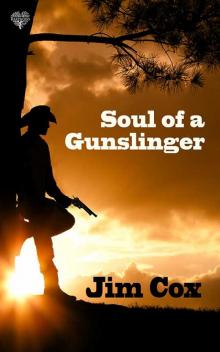 Soul of a Gunslinger
Soul of a Gunslinger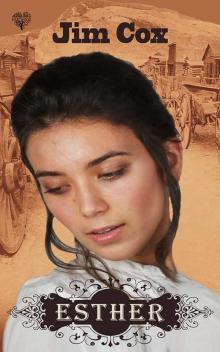 Esther
Esther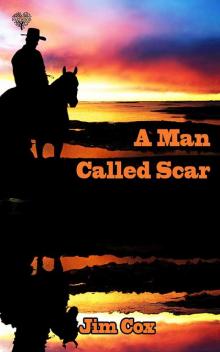 A Man Called Scar
A Man Called Scar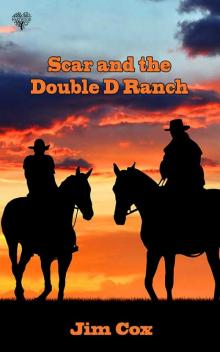 Scar and the Double D Ranch
Scar and the Double D Ranch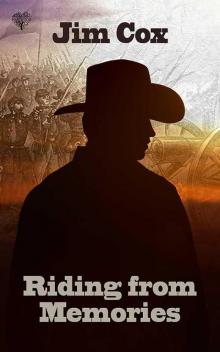 Riding from Memories
Riding from Memories